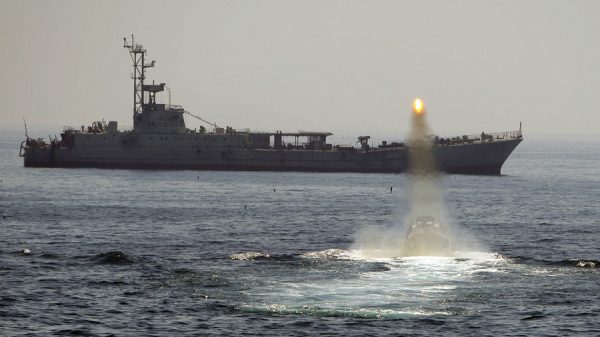
A potential confrontation between the US and Iran is brewing in the Strait of Hormuz after Tehran threatened to block the Gulf passageway in retaliation for Washington’s looming sanctions against Iranian oil exports – a threat the US military said would be immediately countered.
The Trump administration is demanding all countries end imports of Iranian oil by 4 November as part of its new policy of hostility towards Tehran after Washington’s unilateral exit from the 2015 nuclear agreement.
Iran’s president, Hassan Rouhani, responded during a rare visit to Europe this week by signalling that Tehran could disrupt regional crude shipments and cut its cooperation with the UN nuclear watchdog.
On Thursday the commander of Iran’s elite Revolutionary Guards, whose forces patrol the Strait of Hormuz – through which one-fifth of the world’s oil passes in tankers – said the Guards were ready to put Rouhani’s words into action if necessary.
The US navy signalled it was ready to confront Tehran militarily in response.
Mohammad Ali Jafari, the Guards commander, was quoted by the semi-official Tasnim news agency as saying: “We will make the enemy understand that either everyone can use the Strait of Hormuz or no one.”
Bill Urban, a spokesman for US Central Command, said Washington and its allies provided security in the region and would not stand idly by. “Together, we stand ready to ensure the freedom of navigation and the free flow of commerce wherever international law allows,” he said.
The threats will bring back memories of the latter years of the 1980s Iran-Iraq war, when US forces attacked Iranian territorial waters after a US ship struck an Iranian mine.
Rouhani returned to Tehran on Thursday after lobbying European leaders to deliver a robust rebuttal to the US withdrawal from the nuclear deal.
“The Americans have claimed they want to completely stop Iran’s oil exports. They don’t understand the meaning of this statement because it has no meaning for Iranian oil not to be exported while the region’s oil is exported,” Rouhani said this week in Switzerland.
“If you can do such a thing, do it and see the result,” Rouhani added in a threat that was lauded at home by the commander of the Quds force, Qassem Suleimani.
The fate of the nuclear deal is in the balance after Donald Trump pulled the US out of it in May before imposing new sanctions despite European resistance and Tehran’s adherence to the agreement, as verified multiple times by the International Atomic Energy Agency (IAEA).
Although the US initially demanded all countries end imports of Iranian oil in the autumn, it is likely to grant temporary exceptions to countries that rely heavily on Iranian crude such as China, India and Turkey.
Ellie Geranmayeh, a senior policy fellow at the European Council on Foreign Relations, said Iran did not view the nuclear agreement solely through the prism of an economic agreement, but also as a political and security deal. She said the Trump administration’s policy was not solely to exit the joint comprehensive plan of action (JCPOA) but also to make it impossible to sustain it.
Rouhani had two overarching messages during his visit to Europe, Geranmayeh said. “First, Iran expects more concrete action from all parties to the nuclear agreement to sustain economic channels. Second, sustaining oil exports and market share is a red line for Iran.
“If Trump implements his threat to squeeze Iran’s oil exports, Tehran is prepared to escalate against the US to impose direct costs for global oil markets. This is a core issue of national security behind which there is growing backing from the political establishment.”
Despite the US’s withdrawal, the deal has not yet collapsed as Europe remains committed to salvaging it. Geranmayeh said Europe was expected to present a more concrete economic package to Iran during a ministerial meeting at the JCPOA’s joint commission on Friday.
Also at stake is Rouhani’s political career. The agreement is the moderate cleric’s main achievement in office, for which he was rewarded with a second term last year, but Trump’s antagonism towards Iran has empowered Rouhani’s hardline opponents at home, risking him becoming an early lame duck.
Trump’s hostility has compounded the country’s economic woes, while Iran is going through weeks of protests due to a currency crisis and environmental issues. Hardliners have started their onslaught on Rouhani, blaming his economic performance for the protests.
REUTERS

Leave a Reply
You must be logged in to post a comment.